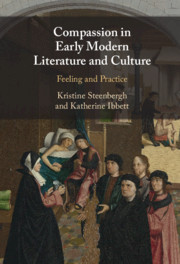Book contents
- Compassion in Early Modern Literature and Culture
- Compassion in Early Modern Literature and Culture
- Copyright page
- Contents
- Acknowledgements
- Contributors
- Introduction
- Part I Theorising
- Part II Consoling
- Part III Exhorting
- Chapter 5 ‘Compassion and Mercie Draw Teares from the Godlyfull Often’
- Chapter 6 Mollified Hearts and Enlarged Bowels
- Part IV Performing
- Part V Responding
- Part VI Giving
- Part VII Racialising
- Part VIII Contemporary Compassions
- Index
Chapter 6 - Mollified Hearts and Enlarged Bowels
Practising Compassion in Reformation England
from Part III - Exhorting
Published online by Cambridge University Press: 23 April 2021
- Compassion in Early Modern Literature and Culture
- Compassion in Early Modern Literature and Culture
- Copyright page
- Contents
- Acknowledgements
- Contributors
- Introduction
- Part I Theorising
- Part II Consoling
- Part III Exhorting
- Chapter 5 ‘Compassion and Mercie Draw Teares from the Godlyfull Often’
- Chapter 6 Mollified Hearts and Enlarged Bowels
- Part IV Performing
- Part V Responding
- Part VI Giving
- Part VII Racialising
- Part VIII Contemporary Compassions
- Index
Summary
Kristine Steenbergh argues that the Reformation impacted traditional practices cultivating compassion. Late sixteenth- and early seventeenth-century sermons reveal a concern over the disappearance of traditional habits of charitable giving and affective meditation, and explore new forms of nurturing a capacity for sharing in the suffering of others. Clergymen thought that a mollified heart requires constant practice. With the loss of traditional habits of charity, they feared their congregations’ hearts were in danger of hardening against the sight of suffering. These concerns are expressed in a recurrent image: in their sermons, preachers worry that the members of their congregation suffer from hardened, closed and dry bowels. The concept of the ‘bowels of compassion’ is central to early modern practices of charity and fellow-feeling: these organs need to be soft and moist to open and stretch towards those in need, to share in their suffering. The active process of compassion was seen as a long-term process of softening the bowels – a concept that brings together religious terminology with humoral and bodily notions of the workings of compassion.
Keywords
- Type
- Chapter
- Information
- Compassion in Early Modern Literature and CultureFeeling and Practice, pp. 121 - 138Publisher: Cambridge University PressPrint publication year: 2021
- 1
- Cited by



